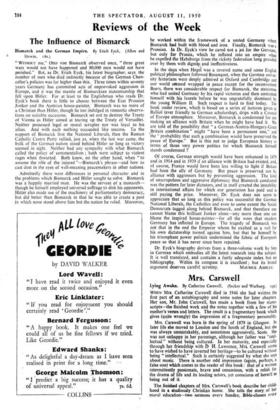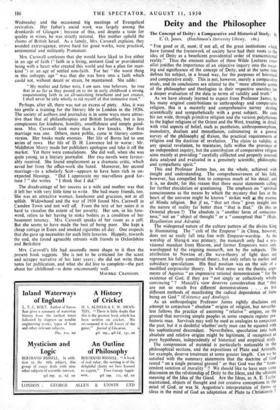Mrs. Carswell
Lying Awake. By Catherine Carswell. (Secker and Warburg. us.)
WHEN Mrs. Catherine Carswell died in 1946 she had written the first part of an autobiography and some notes for later chapters. Her son, Mr. John Carswell, has made a book from her manu- scripts—the finished work and the notes together with a few of his mother's verses and letters. The result is a fragmentary book which gives (quite wrongly) the impression of a fragmentary personality.
Mrs. Carswell was born in the spring of 1879 in Glasgow. Is later life she moved to London and the South of England, but she was always unmistakably, and sometimes aggressively, Scots. She was not unhappy in her parentage, although her father was "intel- lectual " without being cultwed. In her maturity, and especially through her friendship with D- H. Lawrence, Mrs. Carswell seems to have wished to have inverted her heritage—to be cultured without being “ intellectuaL" Such is certainly suggested by what she Ws about music. There is another odd impression (again, perhaps, a false one) which comes to the reader of this book: that of a woman intermittently passionate, brave and censorious, with a relish for the drama of life and its leading actors, yet conscious of herself as being out of it.
The finished chapters of Mrs. Carswell's book describe her child- hood in a studiously Christ-11n home. She tells the story _of her moral education—two sermons every Sunday, Bible-classes everY
Wednesday and the occasional big meetings. of Evangelical revivalists. Her father's social work was largely among the drunkards of Glasgow ; because of this, and despite a taste for quality in wines, he was strictly teetotal. Her mother upheld the claims of British Israel. As a family, Mrs. Carswell explains, they avoided extravagance, strove hard for good works, were practical, sentimental and militantly Protestant.
Mrs. Carswell confesses that she would have liked to live either in an age of faith (" faith in a living, sentient God or providential being with a heart who created this world and has a plan for man- kind ") or an .age of settled non-faith. For her " the worst thing in this unhappy age " was that she was born into a faith which could not, without deceit or strain, be maintained. She adds: " My mother and father were, I am sure, true believers. So true that in so far as they passed on to me in early childhood a strong, unquestioning faith in an all-sustaining beneficent and just creator, I shall never be able wholly to rid myself of that instinctive trust."
Perhaps, after all, there was not an excess of piety. Alas, it was too gentle a training for the literary life in London in the 1920s. The society of authors and journalists is in some ways more attrac-. tive than that of philanthropists and British Israelites, .but is less conspicuous for kindness, humility, unselfishness and simple good- ness. Mrs. Carswell took more than a few knocks. Her first marriage was one. Others, more public, came in literary contro- versies. Her books made enemies. Her life of Burns led to one series of rows. Her life of D. H. Lawrence led to worse • Mr. Middleton Murry made her publishers apologise and take it off the market. Yet there were consolations. She did well, when she was quite young, as a literary journalist. Her two novels were favour- ably received. She found employment as a dramatic critic, which saved her from the office-work she hated. Moreover, her second marriage—to a scholarly Scot—appears to have been rich in un- expected blessings. " Did I appreciate my marvellous good for- tune ? " she writes. " I think that I did."
The disadvantage of her success as a wife and mother was that it left her with very little time to write. She had many friends, too. She was an attractive woman, handsome and gracious, not at all selfish. Widowhood and the war of 1939 found Mrs. Carswell in Camden Town and not well off. From the text of her notes it is hard to visualise the extent of her poverty. Her son, in his fore- word, refers to her having to stoke boilers as a condition of her basement tenancy. Mrs. Carswell speaks of her room as a cell. But she seems to have made the best of being poor. She kept a cheap cottage in Essex and smoked cigarettes all day. One suspects that she gave up necessities for such little luxuries. Happily, towards the end, she found agreeable retreats with friends in Oxfordshire and Berkshire.
Mrs. Carswell's life had assuredly more shape to it than the present book suggests. She is not to be criticised for the scant and scrappy narrative of her later years.; she did not write these notes for publication, and what she did live to complete—the part about her childhood—is done uncommonly well.
MAURICE CRANSTON.



































 Previous page
Previous page